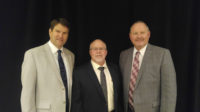The Utah Chapter of the Associated General Contractors of America opened its 91st Annual Convention Jan. 24 at Salt Lake City’s Little America Hotel on an optimistic economic note.

At the opening luncheon, a panel of six economists and business experts from the state and private industry told AGC members they see the state’s economic glass as half full, and even overflowing, as they look at the coming year.
Spencer Eccles, executive director of the Utah Governor’s Office of Economic Development, who also addressed AGC members at last year’s convention, said his office expects continued measured growth and improvement in the Utah economy, as large national companies like Adobe, EBay and Boeing continue to locate and expand their operations in the state.
“We are a well-managed state, and we are friendly to business,” Eccles said, noting Utah has been named by Forbes magazine as the “Best State for Business” for three consecutive years. “Things are relatively predictable here, and as businesses look around the country, they want an island of tranquility where things are predicable—and that is Utah,” he said.
Fellow panelist and retired Wells Fargo economist Dr. Kelly Matthews said he was equally confident in the stability of the Utah economy and forecasted continued steady overall growth, particularly in the housing sector. “When you talk about real gross domestic product, I expect the same rate of about 2% to 3% growth per year for the next two years,” he said. “We have seen growth in the housing market recently. Nationally, I don’t think the economy is strong enough to sustain it, but in Utah I think the employment and job growth we have will be strong enough to maintain and continue growth in the housing sector.”
Natalie Gochnour of the Salt Lake Chamber of Commerce said she expects Utah’s economy to continue growing and maintaining a diversity of industry. “Last year we saw about a 3% growth, and that is good for us. We have the second-fastest growing economy in the country after North Dakota, but that is the result of the boom in natural gas and oil development,” Gochnour said. “We have the sixth-most diverse economy in the country. We have a good mix of technology, tourism, manufacturing, service sectors and so on. Last year we saw growth in all the sectors except for government, and that generally brings a smile to most people’s faces.”
Gochnour reminded the group about the poor air quality that has plagued the Wasatch Front this winter and several times during the summer. For several days in January, cities in northern Utah were cited by the EPA as having the worst air quality in the country.
“Our air quality is really getting to crisis proportions,” she said. “It affects our health, how well we work, and it is something people consider when they look at moving here. We need to work to solve this.”
Mark Bouchard, senior managing director for commercial real estate broker CB Richard Ellis Inc. said he was optimistic about near-term growth but sounded a cautionary note about education, after working for the past year on a committee evaluating education in the state.
“In the past year, I’ve immersed myself in understanding public education. In the past, we have been known for our young, well-educated work force. But now, by all the indicators we use to measure outcomes—reading scores, graduation rates, ACT scores—every one of them is in major decline, almost a freefall,” he said. “If we don’t get serious about investing in public education and higher ed, we are going to be in real trouble producing the kind of work force that companies will need in the future. You guys shape the skyline of this city, but if we don’t have workers that companies need to grow or move here, your ability to create that skyline is diminished. We don’t have to wait until we are last in everything before we do something.”
Matthews reminded attendees to keep core financial principles in mind going forward. “The lesson we should learn or relearn from the financial problems of the recent past is that we need to be very careful about how we manage our debt, our capital and expenses. Stick close to those basic financial principles.”
Eccles said his advice to AGC members going forward would be to keep on top of business trends, pay attention to which companies are looking to locate in the state and how specialized construction skills can be of use to them.


Post a comment to this article
Report Abusive Comment